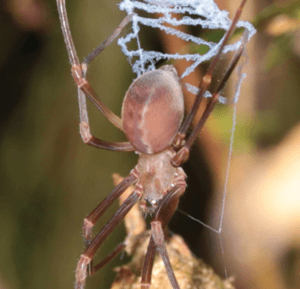Progradungula facts for kids
Quick facts for kids Progradungula |
|
|---|---|
 |
|
| P. otwayensis | |
| Scientific classification |
|
| Kingdom: | Animalia |
| Phylum: | Arthropoda |
| Subphylum: | Chelicerata |
| Class: | Arachnida |
| Order: | Araneae |
| Infraorder: | Araneomorphae |
| Family: | Gradungulidae |
| Genus: | Progradungula Forster & Gray, 1979 |
| Type species | |
| P. carraiensis Forster & Gray, 1979
|
|
| Species | |
|
|
Progradungula is a special group of spiders found only in Australia. These spiders are known as "large-clawed spiders" because of their strong claws. Scientists Raymond Robert Forster and Michael R. Gray first described this group in 1979.
As of 2019, there are only two known species in the Progradungula group: P. carraiensis and P. otwayensis.
What's in a Name?
The name Progradungula has an interesting meaning. It comes from two parts:
- The Latin word pro, which means "before".
- The name of another spider group, Gradungula.
So, Progradungula means "before Gradungula". This name was chosen because these spiders are very old. They represent an ancient part of the spider family tree.
Ancient Spiders and Their Webs
Progradungula spiders are very important to scientists. They were the first discovered cribellate spiders that build webs. A cribellate spider uses a special silk-spinning organ called a cribellum. This organ makes very fine, fuzzy silk. This silk helps them catch prey without using sticky glue.
These spiders belong to a group called Araneomorphae. This is the largest group of spiders, including most of the spiders you see today. Finding Progradungula helped scientists understand something big. It showed that all araneomorph spiders likely evolved from ancestors that used cribellate silk. This means that the way these spiders build their webs is a very old skill!
See also
 In Spanish: Progradungula para niños
In Spanish: Progradungula para niños
 | Precious Adams |
 | Lauren Anderson |
 | Janet Collins |

